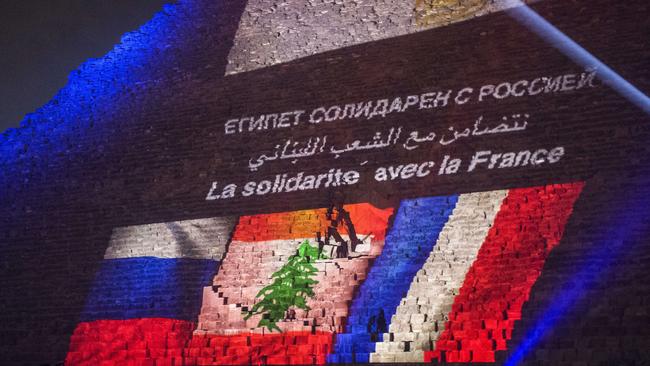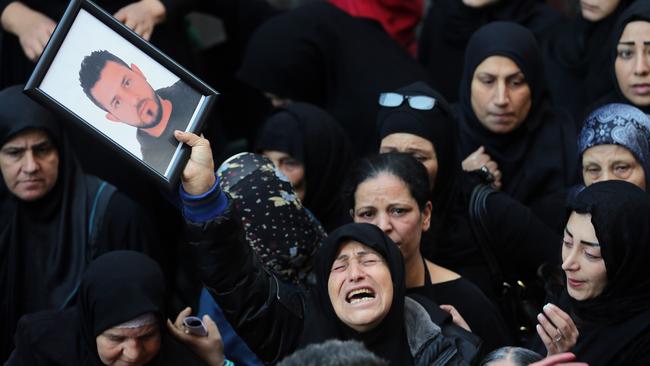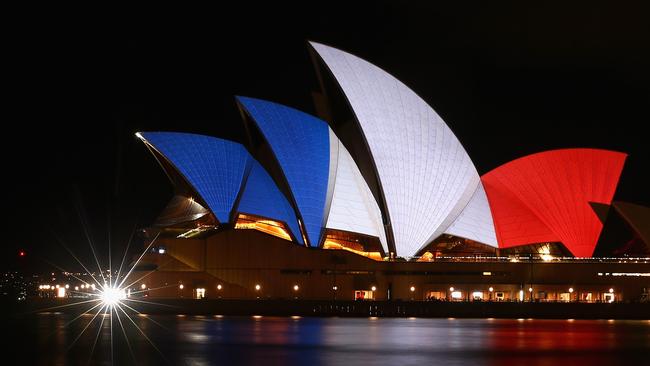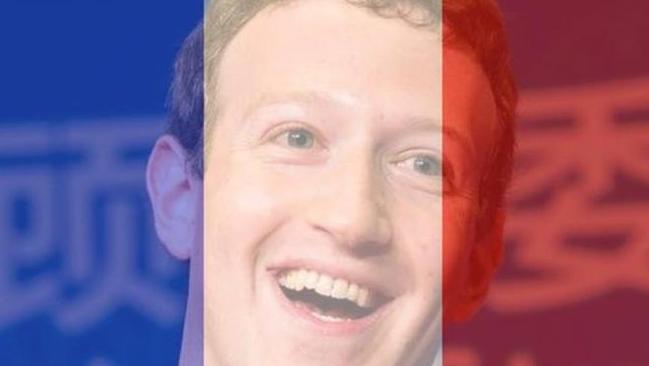Criticism of world’s focus on Paris after terrorist attack at the expense of Beirut
TWO capital cities suffered murderous terrorist attacks in 24 hours. So why is only one country’s flag lighting up skyscrapers and Facebook?

WITHIN 24 hours, two brutal attacks took place in two capital cities. Scores of people, whose only crime was to be in the wrong place at the most deadly of times, were murdered in both. The same group of terrorists claimed responsibility.
But while landmarks across the globe have been bathed in the red, white and blue of the French flag to mark the horrific events in Paris, including the Sydney Opera House, criticism has been mounting that few buildings have been lit up with the red, white and green of the Lebanese banner despite more than 40 people dying just hours before in an attack on the streets of Beirut.
Facebook has also had to defend itself against accusations of double standards after it activated its ‘safety check’ feature only after the massacre in Paris, not Beirut.
Where are the social media apps to change people’s profile pics to the colors of the Lebanon flag in the aftermath of the #BeirutAttacks?
— Jason Chesnut (@crazypastor) November 15, 2015IS have reportedly said they were behind Thursday’s attack in a suburb of Beirut mostly populated by Shiite Muslims which saw 44 people killed after two suicide attackers detonated their bombs.
Beirut, which has been described as ‘the Paris of the Middle East’ due to its rich history and culture, is the capital of one of the most religiously diverse countries in the region where Christians rub shoulders with Muslims.

LIT UP LANDMARKS
The incident passed by with cursory mention. However, on Saturday, as the shocking events in Paris where at least 120 people were killed was still unfolding, NSW Premier Mike Baird said France’s tricolour flag would be raised above the Harbour Bridge and the colours projected onto the Opera House sails joining London’s Buckingham Palace and New York’s Empire State Building among many others.
“We mourn with you and stand with you, Paris,” Baird tweeted.
The difference in how the world responded to the bombings was not lost on Lebanese blogger Joey Ayoub who says he calls Paris his “second home.”
“These have been two horrible nights,” he said of the attacks in Paris and Beirut on his Hummus for Thought blog.
“[But] It seems clear that to the world, my people’s deaths in Beirut do not matter as much as my other people’s deaths in Paris.

“We don’t get a safe button on Facebook. We don’t get late night statements from the most powerful men and women alive and millions of online users.”
Indeed, Australian political leaders lined up to tweet about Paris but very few did the same about Beirut.
Australians' thoughts, prayers & resolute solidarity with people of France as they respond to brutal terrorist attacks in Paris tonight.
— Malcolm Turnbull (@TurnbullMalcolm) November 14, 2015
The people of Paris are in our thoughts and prayers. The world will not give in to fear.
— Bill Shorten (@billshortenmp) November 14, 2015
Increasingly, Australian social media users have called on the Lebanese cedar tree to be given the same symbolical presence as the tricolour.
My thoughts with Paris and Beirut today. If they're going to light up the Opera House with blue, white, red, then light it with a cedar too.
— Omar Musa (@obmmusic) November 14, 2015
THEY’RE ALL INNOCENT LIVES
CEO of non-religious community organisation Arab Council Australia, Randa Kattan, said the Australian Lebanese community was one of the country’s largest minorities but events in Beirut seemed to have got little attention.
“Because Beirut and Paris happened around the same time people are feeling particularly excluded that very little has been mentioned and it seems Arab lives don’t matter as much.”
“If we condemn one killing, we need to condemn the other; they’re all innocent lives,” she told news.com.au.
However, Ms Kattan questioned whether projecting the Lebanese flag onto the Opera House was the answer. “I’m not sure I want to see any flags being displayed because as soon as you put up one flag you’re excluding others that have died and I’m all for inclusion.”
Shadow foreign minister Tanya Plibersek, whose Sydney electorate includes the Opera House, said decisions about what flags to display were a matter for the state government but she had made reference to the Beirut bomb and Russian jet disaster, as well as Paris attacks, over the weekend.
“Labor condemns terror wherever it occurs,” she told news.com.au.
Premier Baird did not answer questions from news.com.au about whether he was considering raising the Lebanese flag or projecting it in a similar way to the French flag. A spokeswoman for Mr Baird said, “The Premier has condemned the cowardly attacks that took place in both Paris and Beirut and has made that clear in his public comments over the weekend”.
Yesterday, Facebook CEO Mark Zuckerberg was forced to explain himself after the social media giant decided to only turn on its ‘safety check’ feature, which was used by four million people to alert their friends that they were out of harm’s way, only after the Paris attacks.
“Until yesterday, our policy was only to activate safety check for natural disasters,” Mr Zuckerberg wrote in a post on his Facebook profile.

“We just changed this and now plan to activate safety check for more human disasters going forward as well.
“We care about all people equally, and we will work hard to help people suffering in as many of these situations as we can.”
While others have noted that while Facebook has enabled users to quickly add a patriotic wash of red, white and blue to their profile pictures, the same has not happened for the Lebanese flag.
The selective nature of highlighting one nation and one group’s suffering above another doesn’t impress Ms Kattan. “We need to be coming up with symbols that are inclusive and not exclusive.”




